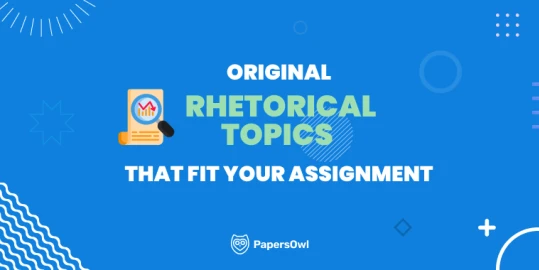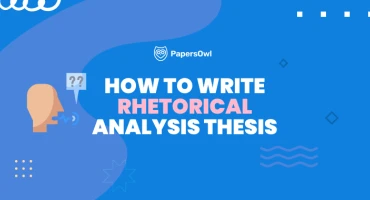Looking for the right topic is often harder than writing the essay itself. A good idea should help you build strong analytical skills and guide your thinking through text, speech, or image. This list of rhetorical analysis paper topics will help you begin with confidence.
Whether you’re exploring politics, literature, or modern media, these ideas can make it easier to write a rhetorical analysis that feels fresh and thoughtful. If you need expert help to write my research papers efficiently, you can always turn to PapersOwl.
What Is a Rhetorical Analysis Essay?
A rhetorical analysis essay breaks down how an author uses words to influence their target audience. It looks closely at rhetorical devices and persuasive moves. The goal is not to agree or disagree with the writer, but to explain how their message works.
To write a rhetorical analysis, start with a plan. In most writing essays, you’ll follow this clear structure:
- Introduction: Begin with the text title, author, and purpose. Add a strong thesis statement showing your rhetorical paper’s focus. For instance, an example of a rhetorical analysis thesis could outline how the author uses ethos, pathos, and logos to persuade the audience.
- Main Body Paragraphs: These explore key rhetorical devices, tone, and style. Use a detailed analysis to explain how the author builds their message and holds the audience’s attention.
- Conclusion: Wrap up by going over the most important points. Reflect on how effective the rhetorical devices were in shaping the message.
This type of essay is a great way to sharpen your reading and critical thinking. It helps you see more than just what is said — it shows how it’s said and why it matters.
How to Write a Rhetorical Analysis Essay?
Rhetorical analysis essay writing is about more than just reading a text. It’s about noticing how words, tone, and style work together to influence the reader. You don’t need fancy tools to write a rhetorical analysis — just a clear mind and a solid plan. Look closely, stay focused, and explain how the message is delivered.
1. Introduction: Pinpoint the Purpose.
Start simple. Mention the speaker, the context, and the primary message. Then, drop your rhetorical analysis thesis. This is your anchor. Don’t just say what the piece is about. Say how it persuades. Example:
In The Seed Manifesto, the author evokes ancestral memory and ecological urgency to push readers toward action.
Use literary devices, tone, and rhetorical devices to map the writer’s intent. Think: metaphor, irony, syntax.
Tip: Avoid vague claims. Instead of “uses emotion,” say “uses loss and silence to stir collective guilt.”
2. Body Paragraphs: Analyze With Precision.
Each paragraph should break down one strategy — ethos, pathos, or logos.
- Ethos: Does the speaker have authority? Credentials? Does the tone suggest honesty?
A scientist citing buried data from 1969 Mars samples builds ethos through archival trust. - Pathos: What feelings are evoked? Fear, awe, nostalgia?
A campaign about disappearing rivers might rely on vanished childhood rituals to provoke grief. - Logos: Are there statistics, logic, facts?
Citing that 1.2 billion trees were cut last year? That’s cold, hard logic.
Blend rhetorical techniques like repetition, symbolism, or figurative language where needed. Every word should support your thorough analysis.
Rhetorical essay topics often involve decoding emotion and logic wrapped in clever phrasing. Choose passages rich in stylistic devices — but stay focused.
3. Conclusion: Pull It All Together.
Restate your central idea. Show how all the elements worked together to achieve the goal. End by reflecting on the importance of symbolism or what impact the piece may have on tertiary audiences.
Writing Tips for Crafting an Effective Rhetorical Analysis Essay
A strong rhetorical analysis essay demands more than just reading between the lines — it requires strategic thinking, clear structure, and relevant examples.
- Choose a suitable topic from real sources, not just abstract ones. Look for rhetorical analysis essay topics tied to speeches, texts, or even ads.
- Write with clear logic. Avoid retelling — focus on how the text argues.
- Don’t skip structure. Each part of such an essay matters.
- Use examples from rhetorical analysis topics for college students, especially ones involving analysis essay topics that feature social change or hidden power plays.
By applying these tips, you’ll sharpen your critical reading skills and craft essays that resonate with insight and persuasive clarity.
How to Choose a Rhetorical Analysis Essay Topic?
Finding the right rhetorical analysis topic comes down to writing about something you’re familiar with. You must showcase insightful analysis to write a rhetorical analysis essay successfully. The best way to do this is to make sure the rhetorical analysis topics you pick are something you’re interested in.
Tip 1. Start by identifying the rhetorical situation and essay topics that interest you.
This will make background research and thematic analysis that much more enjoyable. Then ask yourself:
- What subjects or central themes explored are intriguing for you to analyze rhetorically?
- Are there specific rhetorical analysis example topics in your field of study that you excel in or are passionate about?
- Have you studied similar subjects or texts that might help your rhetorical analysis assignment ideas come to life?
Tip 2. Choose from rhetorical analysis ideas that match your interests and expertise.
Select rhetoric research paper topics relevant to your course or subject area. And make sure there is enough information to write a defined argument. It must be complex enough for a thorough literary analysis of the primary themes and the most valuable persuasive devices.
Tip 3. Make sure the rhetorical analysis paper topic is suitable.
It will need to meet the expectations of rhetorical analysis topics. This means highlighting the importance of symbolism as a role in the author’s message.
- Is there enough emotional depth and background research for you to work with?
- Can you cover the rhetorical situation within the word limit?
- Is it interesting enough to engage your reader?
Trending Rhetorical Analysis Topics in 2026
Rhetorical analysis evolves fast. These rhetorical analysis essay ideas tap into current events and viral discourse. A tweet thread may use humor, emojis, and pacing to form a stance. Ask how modern tools reshape persuasion and rhetorical techniques. The format is new, but the intent is as old as speech.
- 2026 campaign ads using climate fears for votes
- Apple Vision Pro commercials and how they soften surveillance
- Student protests using poetry as protest signs
- Speeches that name AI as “helper,” not “replacement”
- A rhetorical essay on Spotify’s mental health playlists
- Influencer apologies written by PR teams
- TikTok videos using soft voice to sell hard truths
- Threads posts using racial injustice to spark debate
- Gen Z’s use of memes as a quiet protest
- Billboards that use visual arts to imply social rank
- Podcasts that wrap policy in a true crime format
- Drone footage in documentaries as a persuasive device
- Tweets using emotional appeal to boost nonprofit donations
- Ad copy calling lab-grown food “harvested hope”
- Speeches calling for AI regulation, “digital dignity”
Example for rhetorical analysis essay: A meal delivery startup claims its synthetic meat is “grown with care, not cruelty.” A detailed rhetorical analysis would break down that phrase. “Grown” sounds natural. “Cruelty” assumes guilt elsewhere. In this rhetorical analysis essay, you could explore how the ad uses soft verbs and implied harm to shift the moral frame without naming the method.
Comparative Rhetorical Analysis Essay Topics
Comparing two texts opens the door to rich observations. It lets you spot how authors shape meaning differently using tone, structure, or evidence. These rhetorical analysis essay topics help you see where arguments grow or falter. A simple speech on climate policy can shift meaning compared to a scientific brief on the same issue.
- Civic‑tech blog post vs. mayoral debate transcript
- Environmental op‑ed vs. data‑driven agriculture report
- Influencer post vs. scientific astro‑newsletter on dark matter
- Indigenous elder’s speech vs. corporate diversity mission
- Bioethics symposium leaflet vs. patient‑advocacy flyer
- STEM TED‑style talk vs. philosophical essay on tech
- Government press release vs. grassroots NGO pamphlet
- Political figure’s tweet vs. climate report executive summary
- Museum plaque vs. academic journal article
- NPR interview transcript vs. university whitepaper
- Online activist petition vs. bipartisan immigration bill summary
- AI-generated art exhibit label vs. museum curator’s exhibition statement
- University president’s statement on academic freedom vs. student protest flyer
- UN climate resilience roadmap vs. rural community solar project pitch
- Tech CEO’s 2026 keynote on AI ethics vs. whistleblower’s open letter on data bias
Example for rhetorical analysis essay: Compare a poster proclaiming “All‑electric farms now!” with a soil‑survey report on regenerative tech. Notice how the first uses a call‑to‑action. The report uses charts. That contrast shows persuasive strategies at play.
Rhetorical Analysis Essay Topics for High School Students
Learning to unpack rhetorical strategies at the high school level helps sharpen thought. These easy rhetorical analysis topics are clear, focused, and perfect for first-time writers. Students can write rhetorical analyses of ads, school speeches, or editorials. For example, think about how a museum poster might appeal to both emotion and tradition.
- School safety poster vs. assembly invitation
- Snack‑sale flyer vs. a peer’s fundraising email
- Back‑to‑school ad vs. student‑council speech
- Yearbook intro vs. art‑project exhibit caption
- Junior–senior prom invite vs. local business coupon
- Sports pep rally chant sheet vs. team manifesto
- Poster on solar power vs. peer‑written news blog
- Recycling campaign on campus vs. vendor promo email
- Library display vs. book‑review blog post
- Anti‑bullying infographic vs. student council letter
- Career‑day speaker blurb vs. online job listing
- Virtual‑learning flyer vs. teacher’s weekly memo
- Cultural‑festival poster vs. student testimonial
- Volunteer-driven email vs. student‑blog gratitude post
- Tech‑club demo brochure vs. science‑fair manual
Example for rhetorical analysis essay: Analyze a chalkboard announcement for planting trees. Then compare it with a parent‑written note about soil health. The first uses friendly rhymes. The note uses plain facts. Spot how tone and rhetorical devices change the message.
Rhetorical Analysis Essay Topics for College Students
College calls for deeper insight. These rhetorical analysis topics for college students stretch beyond the surface. You might explore an open letter or a peer-reviewed article. Look at how one text draws on data while another leans into the story. The contrast reveals how rhetoric adapts to different minds.
- Open letter on tech‑ethics vs. white‑paper on AI safety
- Peer‑reviewed bioethics article vs. patient blog
- Research abstract on soil sensors vs. an ag‑startup pitch deck
- Astrophysics op‑ed vs. NASA mission briefing
- Aboriginal‑rights essay vs. government treaty summary
- University president’s speech vs. student government manifesto
- Campus environmental report vs. local news coverage
- Tech‑policy think‑tank paper vs. industry blog
- Climate‑change peer review vs. NGO call‑to‑action
- Scholar’s keynote speech vs. academic journal critique
- Industry case study vs. professor’s lecture notes
- Faculty‑written pamphlet vs. activist newsletter
- Medical‑ethics roundtable transcript vs. hospital guide
- Innovation fund prospectus vs. PhD thesis intro
- UNESCO cultural heritage article vs. native community statement
Example for rhetorical analysis essay: Compare a soil‑health research abstract with an open‑forum post by local farmers. One lays out a hypothesis in plain terms. The other bears cultural memory and quiet insistence. Together, they show rhetorical richness and how literary devices shape our sense of purpose.
Rhetorical Analysis Essay Topics on Education
When writers talk about school reform or student loans, the message is rarely just in the facts. These rhetorical essay topics help you explore how educational debates are shaped by tone, fear, or hope. A pamphlet on school safety might use repetition to heighten urgency. That choice matters.
- A college ad promising “limitless futures”
- Tweets during the 2026 school debt protests
- A university mission statement from 1999 vs. 2026
- Student union flyers on mental health
- A textbook preface explaining its “new learning method”
- Online course intros with a “self-paced freedom” tone
- A teacher’s resignation letter from a rural school
- A debate between two state education secretaries
- A graduation speech full of “grit” and “grind”
- Essay on why school uniforms “restore pride”
- Blog post claiming “AI tutors fix broken classrooms”
- Ad for a private coding bootcamp
- High school handbook’s zero-tolerance policy
- Video pitch for a tech-based homeschool platform
- Charter school website focused on “real-world skills”
Example for rhetorical analysis essay: A resignation letter from a teacher includes phrases like “silent halls where art once lived.” That shows rhetorical strategies of emotional contrast. It doesn’t just report — it evokes loss. You can write a rhetorical analysis by tracing how metaphors act as soft weapons.
Rhetorical Analysis Essay Topics on Literature
Literary works play with language and form. These good rhetorical analysis topics focus on novel’s rhetorical strategies, or on how authors stir emotion, build irony, or leave things unsaid. A scene with no clear villain may still lead readers toward judgment. That’s rhetoric at work — quiet, but strong.
- A short story ending mid-sentence: exploring persuasive devices in unresolved narratives
- A machine-like poem on machines: persuasive strategies drawn from rhythm and repetition
- A novel without quotation marks: rhetorical devices shaping voice and ambiguity
- A tragedy where no one cries: analyzing rhetorical strategies of emotional suppression in the shadow of William Shakespeare’s dramatic tradition.
- A first chapter that reads like goodbye: persuasive devices in disorienting literary texts
- A war story with no enemy named: rhetorical analysis of omission in narrative framing
- A final page that’s fully blacked out: rhetorical devices in visual storytelling
- A children’s book narrated by a wall: novel’s rhetorical strategies using silent observers
- A love story told only through objects: persuasive strategies through implied dialogue
- A novel where footnotes argue with the narrator: rhetorical devices in narrative layering
- A comic novel that never breaks its deadpan: analyzing subtle, persuasive strategies
- A villain’s monologue that sounds like Martin Luther King Jr.: Rhetoric devices in moral ambiguity
- A memoir with all characters named after animals: rhetorical analysis of symbolic identity
- A flash fiction styled as a weather forecast: literary texts using form to deliver persuasion
- A reimagined soliloquy that sounds like William Shakespeare in a modern novel: rhetorical analysis of borrowed voices
Example for rhetorical analysis essay: One short story describes a locked garden as “quiet and good.” But what grows there? Thorns. It’s a rhetorical device — calm words hiding a threat. That contrast is how literary devices push emotional responses without shouting.
Rhetorical Analysis Topics List on Speeches
Speeches can move crowds or shift beliefs. These topics for rhetorical analysis essay show how language sways public thought. Even a speech on soil policy can stir action when it’s laced with metaphors and rising cadence. The speaker’s voice is a tool — and a signal.
- Martin Luther King Jr.’s “I Have a Dream” as a model for modern protest cadence
- A senator’s food-tech speech blending agriculture with national pride
- Startup founder’s agricultural pitch: logos meets ambition at a rural expo
- Launch speech of a “smart soil” initiative: how data speaks like poetry
- Farewell address of a city mayor — ethos and nostalgia in public goodbye
- Space debris cleanup lecture: blending scientific ethos with environmental pathos
- Commencement speech built around six viral memes — rhetorical genius or gimmick?
- Climate march chant speeches: repetition and rhythm in grassroots resistance
- University president confronting AI cheating: when logos meets institutional credibility
- A nation’s “call to seed” speech: persuasive appeals in biodiversity rhetoric
- TEDx talk on silence — analyzing the persuasive power of a pause
- Faith and flight: church sermon using drone footage to stir awe and belief
- Corporate apology speech post-research leak: navigating guilt and image repair
- Head of state’s cosmic metaphor: unpacking “we planted stars” as national identity
- Oscar-style acceptance speech that mirrors Martin Luther King Jr.’s cadences
Example for rhetorical analysis essay: A final speech by a research leader says, “We did not fail. We redirected the light.” No facts needed. That rhetorical paper would study metaphor, silence, and speech delivery as survival tools.
Visual Rhetorical Essay Topics
Rhetorical analysis example topics invite you to explore how images, ads, or art persuade. Elements like color, framing, and focus shape the message — sometimes, a photo speaks louder than words. Visual analysis essay writing helps examine these visual elements and their emotional impact on audiences, revealing the power of visual communication in today’s media-driven world.
- Museum poster showing a child facing a glass case
- Election billboard using cracked earth background
- Public service ad: gloves on a windowsill, no people
- Campaign photo where a hand hovers but doesn’t touch
- Protest sign drawn in soil and stone
- Black-and-white food bank ad with full-color apple
- Tree stump as a centerpiece in a housing ad
- Street mural that fades into pavement
- A cover design showing title text buried under sand
- An ad for satellite tech using silhouettes of wolves
- A billboard where sun’s rays are arrows
- Disaster prep poster that mimics vintage theater art
- Documentary poster: smoke forming a DNA strand
- Bus stop ad with a spiral as text path
- Recruitment flyer with a disappearing handshake
Example for rhetorical analysis essay: A mural shows a seed cracking open, leaking light. That’s not just beauty. It’s a visual rhetorical analysis essay waiting to happen. You can trace persuasive language made through the image, not grammar.
Rhetorical Analysis Topics on Society
Writers and scholarly articles often reflect society back to us, sometimes harshly and sometimes gracefully. These rhetorical analysis essay topics explore social commentary. A comic strip may highlight inequality more clearly than a policy brief. Look for irony, exaggeration, and loaded imagery.
- Ads that blame individuals for climate change
- Campaigns urging digital silence in loud cities
- Posters on urban loneliness and artificial light
- Slogans calling unpaid interns “dream seekers”
- Short films framing housing as a moral test
- Social posts about “performative grief”
- News headlines framing the protest as a disruption
- Voter drives targeting one tone for all districts
- Comics that humanize machines and ignore workers
- Flyers pushing kindness instead of justice
- Safety apps that shift danger into your hands
- Public art that paints struggle in soft pastels
- Photo essays linking fashion to water waste
- Town banners masking hunger with celebration
- Memos blaming burnout on “low resilience”
Example for rhetorical analysis essay: A campaign says, “You survived your burnout. So can they.” A rhetorical paper here would ask: Why shift blame? This sentence cloaks pain in praise — and hides systemic failure behind personal strength.
Rhetorical Analysis Essay Topics on Philosophy
Philosophical texts bend language to wrestle with meaning. These rhetorical analysis topic ideas explore how logic and doubt are framed. A short paragraph might contain a dozen shifts in tone. Track how certainty fades or grows across the argument. That’s where rhetoric lives.
- “Free will” essays that use analogies of broken clocks
- Writings that label suffering as a growth tool
- Dialogues using silence as rebuttal
- Philosophers who speak in riddles to dodge finality
- Thought experiments that trap emotion in steel logic
- Claims about time that end in questions
- Papers where truth is called “a working hunch”
- Arguments that call the self a trick of grammar
- Authors who compare belief to hunger
- Writers who describe death using baking terms
- Ethics essays calling guilt “a useful virus”
- Logic built from metaphors instead of math
- Freedom is defined by the absence of longing
- Essays that open with negation and never leave
- Doubt framed as a form of devotion
Example for rhetorical analysis essay: One writer says, “Pain is a compass when stars fail.” You’d examine how this emotional appeal shapes meaning in a detailed rhetorical analysis. It sounds like hope, but it buries fear.
Rhetorical Analysis Essay Topics on History
Student writing about historical events can shape memory. These rhetorical analysis ideas show how facts are framed to guide interpretation. A textbook might flatten rebellion, while a letter from the same era shows fury. Ask what’s emphasized, what’s quieted, and why that matters now.
- War memorial plaques with no verbs
- Textbooks that describe colonization as “arrival”
- Tourist brochures that say “tensions cooled”
- Speeches that erase labor behind invention
- Museum labels using “discovery” for lived lands
- Statutes that shorten names and lengthen virtues
- Documentaries narrating war with a video-game cadence
- Timelines that leave gaps between injustice and change
- Archives that praise “progress” in soil depletion
- Lectures that frame migration as a storm, not a stream
- Presidential letters that soften surveillance
- Exhibits that frame trauma through economics
- Audio guides describing enslavement as “trade”
- Battle maps that shrink villages to smudges
- Public histories with no local names
Example for rhetorical analysis essay: A plaque reads: “Land was exchanged peacefully.” A rhetorical analysis paper would dig into that phrasing. What’s missing? Who speaks? Who disappears? Language frames peace where there was pressure.
Rhetorical Analysis Essay Topics on Business
Business rhetoric sells, defends, or reassures. These rhetorical topics dig into mission statements, ads, and leadership memos. A product pitch may use urgency and scarcity to move a buyer. It’s not just the offer — it’s the voice that sells it.
- Ads that whisper luxury and shout efficiency
- Memos that say “pause productivity to refuel purpose”
- Launch decks using wild animal metaphors
- Press releases calling layoffs a “pivot”
- Investor letters rich with passive verbs
- Brand stories that name soil, not workers
- Loyalty programs are framed as a reward for obedience
- Leadership blogs that describe ethics as “messy”
- Eco packaging claims using “quiet green”
- Sales videos that show the family to sell speed
- Apps promising control in a sea of noise
- Logos that suggest trust through roundness
- Financial charts with storybook narration
- Mission statements that confuse clarity with volume
- CEOs who use baby metaphors to frame ideas
Example for rhetorical analysis essay: A pitch begins: “Our solution tames chaos.” An effective rhetorical analysis essay would probe that word: tame. What wildness does it promise to fix — and who defines the mess?
Rhetorical Analysis Essay Topics on Government
Official language often hides as much as it reveals. These rhetorical analysis essay titles help you look beneath the legalese and speechwriting. A short press release may use passive voice to blur blame. A statement of unity might lean heavily on shared memory. Each word is a choice.
- When politicians call war “a necessary adjustment”
- Speeches that swap “citizen” with “consumer”
- Government ads that use family images for national service
- Legal rulings that avoid the word “loss”
- Memos calling surveillance “protection in layers”
- Emergency notices that never name the cause
- A resignation speech that blames “the system” but not the self
- Press releases that call a protest “noise”
- City bills that phrase budget cuts as “refined focus”
- Health policies are described using weather metaphors
- Campaign texts that say “let’s return to ourselves”
- Official language in reports that call evictions “exits”
- Laws rebranded as “community pivots”
- A mayor’s farewell speech that leaves out rising rents
- President Trump’s speech after Jan 6 and the use of vague restraint
Example for rhetorical analysis essay: A health law calls its cost-saving cuts “light clouds before reform.” A rhetorical essay here could focus on the emotional appeal of the metaphor. Clouds blur sharp facts. Rain implies renewal. But who feels the storm?
Rhetorical Analysis Essay Topics on Culture
Culture speaks through trends, media, and norms. These articles for rhetorical analysis might include viral posts, essays, or ad campaigns. A travel brochure can shape how people view a place or people. What’s left out speaks as loudly as what’s included.
- Ads showing loneliness as fashion
- TikTok voiceovers using vintage audio for climate grief
- Museum guides that call colonization “a shared journey”
- TV shows where technology speaks with warmth
- Music videos framing luxury as rebirth
- Tourism blogs describing people as part of the view
- Instagram posts about “finding yourself” in remote villages
- AI-generated poetry sold as “organic thought”
- Brochures that flatten traditions into “local flavor”
- Celebrity interviews that package trauma as branding
- Corporate posts on culture using food as a metaphor
- Product labels calling plants “tiny rebels”
- Viral tweets that mask mockery as unity
- Clothing ads using abstract images to blur exploitation
- Podcasts that sell silence as power while speaking non-stop
Example for rhetorical analysis essay: A fashion ad splashes slow-motion trees over blurred bodies. The rhetorical devices hide fast labor behind soft moss. A good rhetorical analysis might ask: What happens when speed wears a calm face?
Conclusion
To write a rhetorical analysis is to trace the hidden levers of language. Each detailed analysis of primary themes shows how rhetorical devices shape thought, stir feeling, and shift belief.
This list offers over 200 rhetorical topics to sharpen your academic writing and refine your sense of persuasive strategies. Whether decoding an acceptance speech or a quiet pause in a debate, you’ll learn how tone, rhythm, and structure guide a target audience.
As your essay writing deepens, you won’t just name rhetorical devices — you’ll use them with intent. That’s the heart of strong, clear, and human persuasion.






